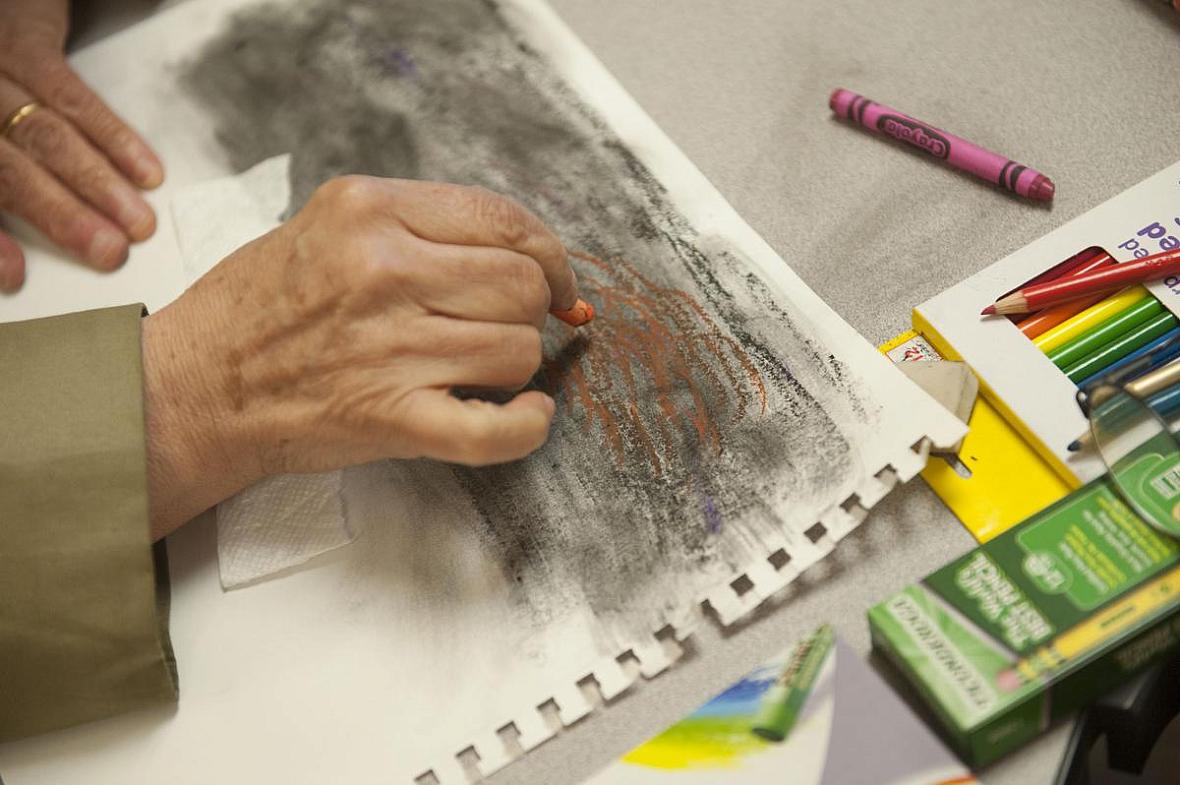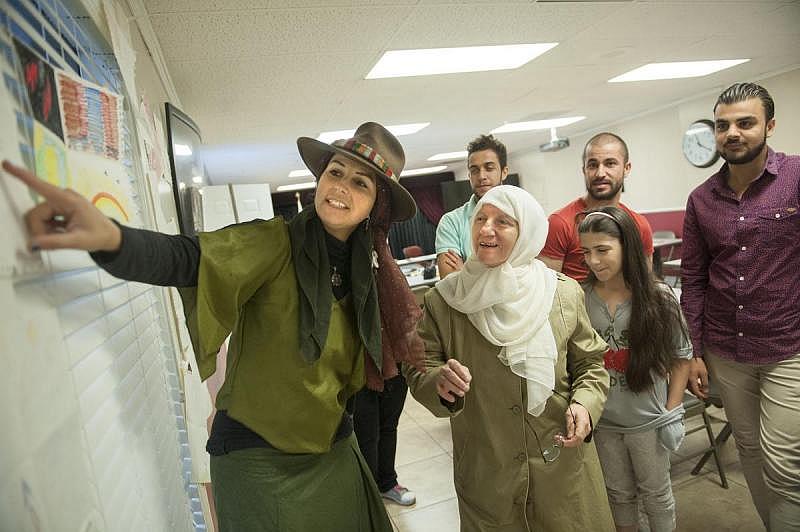Art class helps erase stigma of mental illness in Arab community
This article was produced as a project for the California Health Journalism Fellowship, a program of the Center for Health Journalism at the USC Annenberg School for Communication and Journalism.
Other stories in the series include:
'I was too proud to ask for help,' Vietnamese immigrant says of her struggle with mental illness
Family's experience helps Korean Americans change mindset about mental illness

This art workshop at Access California Services in Anaheim helps Arab-Americans, the larger community and refugees better express their emotions and helps participants transcend the stigma associated with mental health through art. Many refugees have experienced loss and tragedy which the program hopes to address and help direct some to counseling.
This is the third story in a series on how mental illness is perceived and addressed in different cultures.
Zuher Belal put a black pencil on the rectangular piece of paper stretched out on a table.
The 21-year-old Damascus native with a shock of brown hair and a playful smile, drew a Muslim man with arms outstretched in prayer.
Then, he drew an airplane dropping a bomb.
This was Belal’s daily dose of reality until four years ago when he fled the only home he’s ever known with his parents and three siblings.
“The man is praying,” Belal says in halting English, explaining his art. “He wants the bombing to stop.”
Like most others in Access California Services’ Stigma Arts class, Belal is a refugee. This is the fourth year the Anaheim-based nonprofit that provides services and support for Orange County refugees has held this particular art program. It is designed to explore the stigma of mental illness from a culturally competent perspective through arts as opposed to verbal communication.
The classes aimed at reducing mental health stigma in ethnic communities such as Arab, Chinese, Korean, Vietnamese, Latino and Persian, are being held in Orange County. Art classes at community clinics for underserved minority populations are funded by a grant from the Orange County Health Care Agency under the umbrella of the Multi-Ethnic Collaborative of Community Agencies, a Santa Ana-based nonprofit.
In the Arab community, stigma prevents people from getting help, said Nahla Kayali, executive director of Access California Services.
“The problem is so severe that many people stigmatize themselves,” she said. “They feel they are crazy.”
In Arabic, the word majnoon means crazy. That’s often the word used to describe those with mental illnesses, Kayali said.
Her organization, while fighting to reduce and eliminate such stigma, has also been put in the strange position of accommodating it.
“Otherwise, people wouldn’t come,” Kayali said.
Those who visit the clinic for mental health counseling enter through an unmarked glass door, strategically located so those on the outside can’t tell if the person entering is going to get counseling or walking into an urgent care center next door.
Waiting rooms are designed so patients don’t see one another.
“Many people don’t even tell family members that they are going to counseling,” Kayali said. “With kids, and particularly girls, it’s even more, because parents are worried they’ll get labeled.”
Kayali has seen the art program open up people’s minds and personalities.
Christin Farmer, founder of the nonprofit Birthing Beautiful Communities, carries 2-month-old Knoelle Holmes, whose birth was attended by a BBC doula, before a free weekly class at the organization's offices in Cleveland in July. (Thomas Ondrey, The Plain Dealer)
It’s advertised as an art class. But counselor Muna Brejeyeh explains the purpose of the program to participants during the first class. About 25 percent of those who attend the art classes seek counseling later, Khayali said.
“Art is something that goes much deeper,” she said. “It’s a way for them to get their frustrations and anxieties out.”
Sama Wareh, a Silverado Canyon artist who has taught this class at Access for four years, has one rule for her students.
“Take everything that’s occupying your mind and let it go,” says Wareh, whose parents are immigrants from Syria.”We are going to find out things about ourselves in this class.”
The class is also a place, she adds, where they can discuss their problems.
“We all have problems, but the issue with our community is we don’t like to talk about them,” she says in Arabic. “We pretend to have prefect lives when we don’t.”
As a first exercise in expressing their feelings, Wareh asks participants to draw four emotions: joy, sorrow, peace and anger.
Nawal Nasri, 71, of Anaheim, came from Syria as a refugee who fled after her home was destroyed by a bomb. Three of her grown children are still in Syria because they didn’t get visas to leave the country, and she worries about them every day.
Art gives her hope, she says.
“Most people who come here are refugees or asylum seekers,” she said. “We understand each other and share our sadness.”
For Wareh, the class has taken on new meaning this year. Eight months ago, her brother committed suicide after struggling with depression. She talked about it for the first time in class, as participants listened in silence.
“He died because he didn’t get any help or treatment,” she said. “He didn’t have to die.”
After his death, her parents went public because they wanted to remove the stigma around mental health issues, Wareh said.
“Our imam talked about it in the mosque, I talk about it now,” she said. “Sharing our stories can be a powerful thing. People need to be more honest about these issues. I teach this class every year. But this year it’s different because I’ve gone through it myself.”
The stigma is strong whether you’re a refugee or someone like Heba Morsi, a Tustin resident and mother of three who moved with her parents from Egypt when she was 8. Morsi says it’s a cultural and religious issue.
“People in our community don’t even recognize mental illness,” she said. “You don’t air your laundry in public. Islamic teachings say we should be patient and pray through our problems, that God is testing us to purify us.”
But Morsi says she has seen first-hand the benefit of opening up to others.
“When I do that, I know you’re human just like me.”
[This story was originally published by The Orange County Register.]
[Photos by Ana Venegas, Orange County Register/SCNG.]

